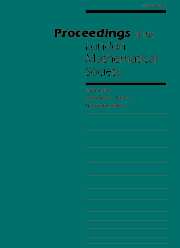Crossref Citations
This article has been cited by the following publications. This list is generated based on data provided by
Crossref.
Narkiewicz, Władysław
2012.
Rational Number Theory in the 20th Century.
p.
307.
Dartyge, Cécile
2015.
Le problème de Tchébychev pour le douzième polynôme cyclotomique.
Proceedings of the London Mathematical Society,
Vol. 111,
Issue. 1,
p.
1.
Frantzikinakis, Nikos
and
Host, Bernard
2016.
Higher order Fourier analysis of multiplicative functions and applications.
Journal of the American Mathematical Society,
Vol. 30,
Issue. 1,
p.
67.
Harpaz, Yonatan
and
Wittenberg, Olivier
2016.
On the fibration method for zero-cycles and rational points.
Annals of Mathematics,
p.
229.
Browning, T. D.
2017.
MANY CUBIC SURFACES CONTAIN RATIONAL POINTS.
Mathematika,
Vol. 63,
Issue. 3,
p.
818.
Heath-Brown, D. R.
and
Li, Xiannan
2017.
Prime values of $$a^2 + p^4$$ a 2 + p 4.
Inventiones mathematicae,
Vol. 208,
Issue. 2,
p.
441.
Destagnol, Kevin
and
Sofos, Efthymios
2019.
Rational points and prime values of polynomials in moderately many variables.
Bulletin des Sciences Mathématiques,
Vol. 156,
Issue. ,
p.
102794.
MAYNARD, JAMES
2020.
PRIMES REPRESENTED BY INCOMPLETE NORM FORMS.
Forum of Mathematics, Pi,
Vol. 8,
Issue. ,
Pratt, Kyle
2020.
Primes from sums of two squares and missing digits.
Proceedings of the London Mathematical Society,
Vol. 120,
Issue. 6,
p.
770.
Harpaz, Yonatan
Wei, Dasheng
and
Wittenberg, Olivier
2022.
Rational points on fibrations with few non-split fibres.
Journal für die reine und angewandte Mathematik (Crelles Journal),
Vol. 2022,
Issue. 791,
p.
89.
Li, Xiannan
2022.
Prime values of a sparse polynomial sequence.
Duke Mathematical Journal,
Vol. 171,
Issue. 1,
Hirakawa, Yoshinosuke
and
Shimizu, Yosuke
2022.
Counterexamples to the local-global principle for non-singular plane curves and a cubic analogue of Ankeny-Artin-Chowla-Mordell conjecture.
Proceedings of the American Mathematical Society,
Wong, Siman
2023.
On the rank of cubic and quartic twists of elliptic curves by primes.
Journal of Number Theory,
Vol. 246,
Issue. ,
p.
157.
Wong, Siman
2023.
Elliptic curves with few bad primes.
International Journal of Number Theory,
Vol. 19,
Issue. 01,
p.
59.
Granville, Andrew
2023.
Missing digits and good approximations.
Bulletin of the American Mathematical Society,
HIRAKAWA, Yoshinosuke
2024.
Primes of the form $X^{3} + NY^{3}$ and a family of non-singular plane curves which violate the local-global principle.
Journal of the Mathematical Society of Japan,
Vol. 76,
Issue. 2,




